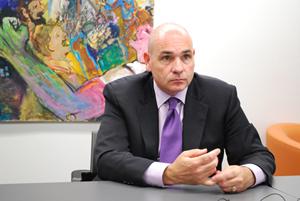Calling them “shooting galleries,” mayoral candidate George Smitherman is blatantly ignoring evidence that supervised safe injection sites reduce drug use, a local AIDS activist says.
The two frontrunner candidates – Smitherman and Joe Pantalone – were sharply divided on harm reduction strategies at the 519 Church Street Community Centre mayoral debate Monday night, garnering loud cheers and jeers from the audience.
“I do not support safe injection sites because I am not convinced of its merits,” Smitherman said.
Pantalone said he supports safe injection sites.
Candidate Rob Ford did not attend the debate due to “previous commitments.”
Alex McClelland from AIDS Action Now, who was at the debate, asked the candidates if they will continue to support the Toronto Drug Strategy’s Drug Prevention Community Investment Program, which funds opportunities for non-profit organizations to address drug use in Toronto.
McClelland asked if the funding allocation would increase or decrease from the 2010 to 2011 amount of $844,208.
After Smitherman said he planned to keep funding at its current level, he offered his opinion on harm reduction strategies, specifically safe injection sites and needle exchanges.
Many in the crowd booed at his answer.
“He’s pretty ill-informed, which is really disappointing considering he is a former health minister,” McClelland told Xtra. “Calling them shooting galleries is really offensive. He is blatantly ignoring evidence.”
Toronto has more injection drug users than any city in Canada, McClelland said.
“I really hoped [Smitherman] would have reconsidered his position by now,” he said. “AIDS has really affected this community.”
Andrew Brett, AIDS Committee of Toronto (ACT) communications coordinator, who was also at the debate, said harm reduction strategies reduce deaths, reduce the need for policing, take drugs off the street and reduce healthcare costs, resulting in savings to taxpayers.
“The reality is some people can’t or won’t stop using drugs,” he said. “So the concept of harm reduction serves to minimize harm from drug use. [Safe injection sites] help reduce HIV and help drug users access important health information through health professionals.”
In August, Toronto became the first city in the world – and the first government in North America – to formally endorse a declaration that advocates harm reduction over the war on drugs, through the Vienna Declaration.
The Vienna Declaration, which criticizes the criminalization of drugs as a major factor fuelling HIV infection rates, calls on policy-makers around the world to refocus their approaches to harm reduction and HIV/AIDS prevention.
Only six city councillors voted against the Vienna Declaration, one of which was Ford, McClelland noted.
“I loved it when Joe Pantalone supported the Vienna Declaration,” said frontline harm reduction activist Zoe Dodd from the Toronto Harm Reduction Task Force board and AIDS Action Now, who was also at the debate. “But it was incredibly upsetting to hear Smitherman call [safe injection sites] shooting galleries.”
Pantalone said he will increase funding to prevention programs with inflation, she said.
AIDS activists at the debate were saddened to hear Smitherman’s position, Dodd said.
“As a man who was health minister, he should know better,” she said. “We need to expand these services to people. His statement speaks to vote-buying and NIMBY-ism.”
Dodd said Toronto desperately requires a needs assessment to gather information about where safe injection sites should be and what harm reduction initiatives should look like in Toronto.
“Some people look at drug users as not having any value, but every life is valuable,” she said. “The injection drug community is losing people all the time.
“So much of our policy on drugs is based on out-of-date laws. The injection drug community is losing people to overdose all the time.”

 Why you can trust Xtra
Why you can trust Xtra


